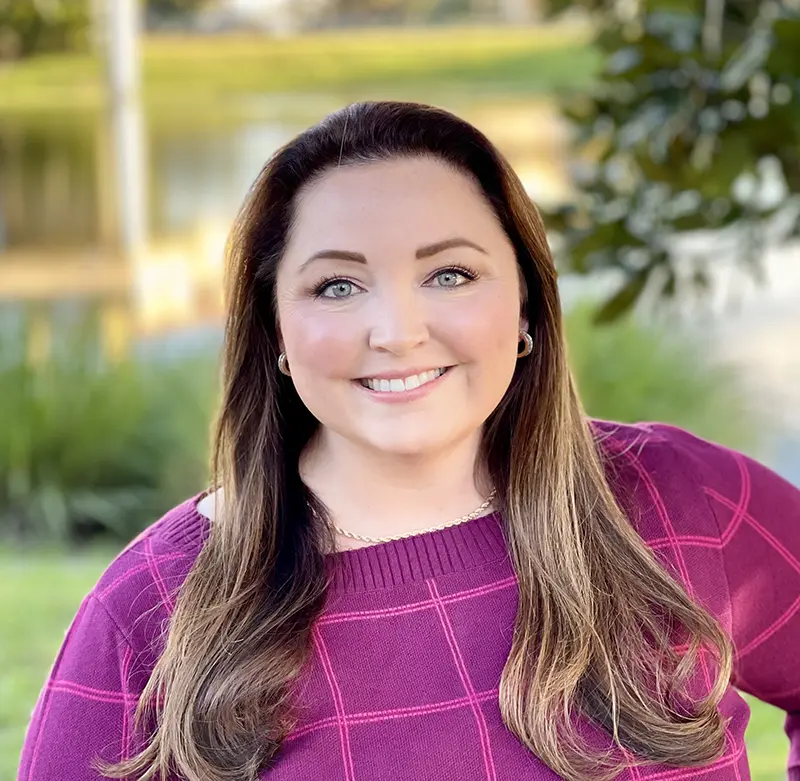
Kristin Mattson, ORAU senior health communication and marketing specialist
Kristin Mattson has always had a desire to help people.
Mattson, ORAU senior health communication and marketing specialist, grew up wanting to be a doctor for as far back as she could remember, but during college fell in love with the concept of preventing illnesses instead of treating them.
“It made so much more sense, and I could help many more people by focusing on prevention as opposed to treatment,” she said.
Mattson graduated from the University of Tennessee, Knoxville, with a Master of Public Health degree and is a Master Certified Health Education Specialist, one of three people at ORAU who hold that certification.
Mattson has directed public health communication, marketing and research, managing large cross-functional teams of employees, partners and subcontractors. She specializes in crafting effective audience-tailored campaigns by conducting formative research, developing communication plans, creating health promotion materials, and delivering training and technical assistance for agencies and organizations to aid in the dissemination and evaluation of messages and materials to priority audiences.
“It has been a passion of mine to work on projects that prevent the harms associated with disease and allow people to live their best lives. My dad, grandmother, aunt, cousin and best friend from childhood have all been diagnosed with breast cancer,” Mattson said. “I’ve seen the physical and mental toll treatment takes on everyone. It’s terrible. Whatever I can do to prevent anyone from having to go down that path, I’m happy to do it and have an impact.”
She has a passion for developing culturally and linguistically appropriate communication materials and a breadth of experience working directly with a variety of audiences from healthcare providers, first responders, parents and teachers, people experiencing homelessness, people who use drugs, and audiences with limited English proficiency.
Whether she’s working on communications campaigns and materials for cancer prevention, improving the health of school-aged children, or educating the public about harm reduction, Mattson says giving people a platform to share their stories makes a huge difference.
“Storytelling is one of the most impactful ways we can change others’ behaviors,” she said. “There’s an art to it. It’s an art and a science.”
Since 2016, Mattson’s work has primarily been focused on promoting school-based health initiatives and improving access to information about evidence-based public health strategies like substance use screening and brief intervention, overdose education and naloxone distribution, and syringe services programs.
Mattson recently led the development of a suite of 71 patient-provider health communication materials for CDC’s “Let’s Talk” initiative including the creation of a new brand identity. She has also directed communications support for CDC Healthy Schools for over a decade, earning a nomination for a CDC Directors’ award in creative communications.
Through her recent work on the National Institutes of Health HEALing Communities Study, she led the development of over 1,250 tailored overdose prevention materials and supported campaign planning and dissemination efforts for eight separate campaigns about naloxone, fentanyl, medications for opioid use disorder, and stigma in 16 communities across Massachusetts netting close to 38 million paid media impressions. Currently, she’s supporting a cadre of eight local harm reduction and syringe services programs by providing communication capacity-building technical assistance on behalf of the National Association of County and City and Health Officials (NACCHO) and assisting with the development of a harm reduction communication toolkit to assist and inspire other organizations around the country with their education, advocacy, and stigma reduction efforts.
She has also conducted more than 60 interviews and led close to 20 workshops aimed at enhancing the communication capabilities of public health entities, including firefighters, law enforcement, and emergency management personnel, on behalf of the CDC, NIH, Appalachian Regional Commission (ARC), and NACCHO.